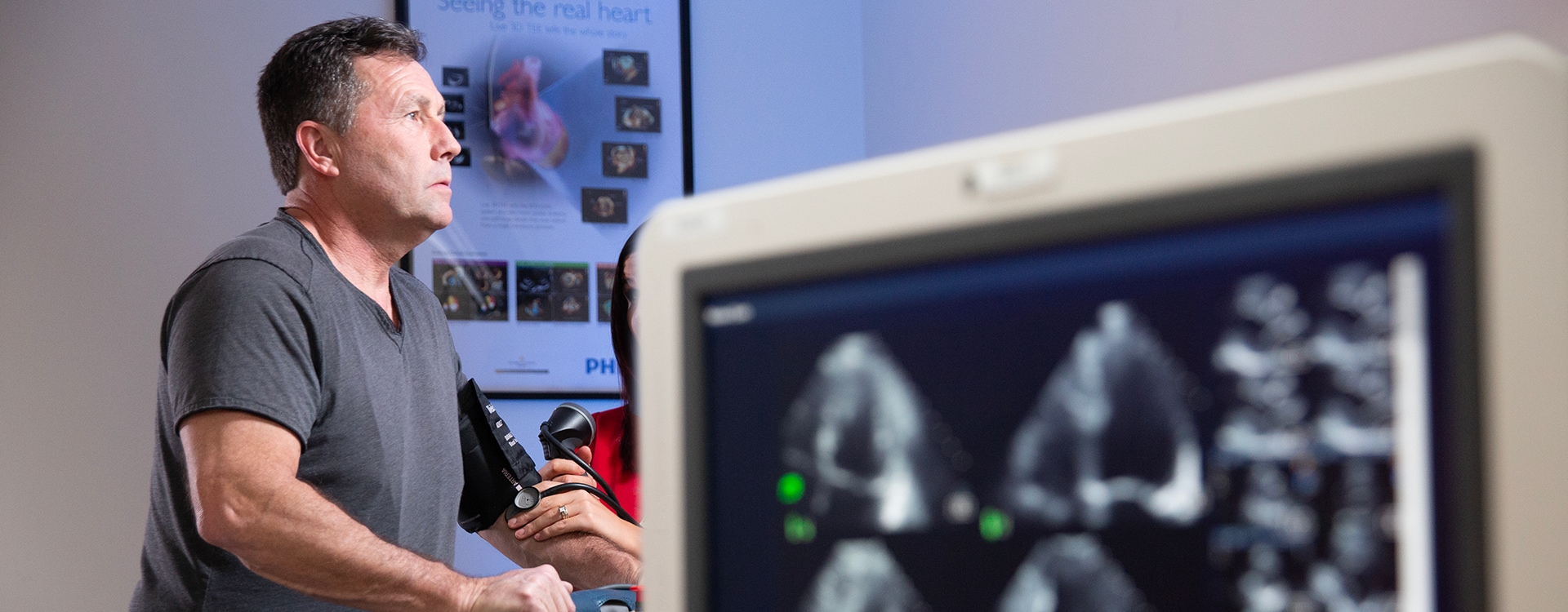
Cardiovascular Testing & Monitoring
If you have symptoms of a condition affecting your heart or blood vessels, your doctor may order tests to make a diagnosis. Explore the full range of exams available at Southern Ohio Medical Center and SOMC Heart & Vascular Associates in Portsmouth. After any test, you can expect timely results that inform the next step in your healthcare journey.
Heart Imaging
To see your heart’s arteries, valves, structure or movement, your doctor may order:
- Cardiac catheterization – Puts a catheter (thin tube) into a heart artery to examine your heart’s chambers, valves or blood vessels
- Cardiac MRI – Uses magnets and radio waves (not radiation) to show the heart
- Coronary calcium scoring – Uses computed tomography (CT) imaging to check your heart arteries for calcium and plaque buildup, a sign of coronary artery disease
- Coronary CT angiogram – Creates 3D images of the heart and its blood vessels
- Echocardiogram – Moves an ultrasound device over your chest to create images of the heart and show blood flow
- Transesophageal echocardiogram – Slides a thin tube with an ultrasound device down the throat to get clearer pictures of your heart
We want you to feel satisfied with your care, so Southern Ohio Medical Center chose to earn accreditation in adult echocardiography from the Intersocietal Accreditation
Commission. That means you can rest assured that we have the right staff, technology and processes to ensure accurate results.
Heart Stress Tests
The following tests show how your heart responds when it must work harder:
- Exercise stress test – Measures heart rate and blood pressure while you walk on a treadmill at gradually increasing speeds
- Medication stress test – Gives you a drug (such as adenosine or dobutamine) to increase blood flow to the heart if an exercise stress test isn’t an option for you
- Nuclear stress test – Injects a slightly radioactive substance (cardiolite) into your bloodstream to make your heart arteries show up on a special monitor so your doctor can check for blockages
- Stress echocardiogram – Uses sound waves to create images of your heart before and after physical activity
Heart Rhythm Monitoring
If you have symptoms of arrhythmia (an unusual heartbeat), you might need one of these tests:
- Electrocardiogram (EKG) – Attaches small electrode patches to your chest to record your heart’s rhythm for a few minutes
- Holter monitoring and event monitoring – Attaches sensors to your chest to record the heart’s electrical activity for one or two days (Holter monitoring) or up to a month (event monitoring)
- Loop recorder – Implants a tiny device under your skin to record your heartbeat for up to three years
Vascular Testing
A healthcare professional may check the health of your arteries or veins using:
- Ankle-brachial index – Compares blood pressure in your ankle to your arm to help a doctor diagnose peripheral artery disease (PAD)
- Arterial and venous duplex – Shows images of certain blood vessels and reveals the speed and direction of blood flow, sometimes after exercise
Other Cardiovascular Tests & Monitoring
- CardioMEMS™ HF system – Places a tiny device into your pulmonary (lung) artery to detect increasing pressure, an early sign of worsening heart failure
Tilt-table test – Looks for the cause of fainting by tracking your heart rate and blood pressure as you lie on a table that’s gradually tilted upward
Getting Your Results
Your heart or vascular exam results appear in your patient portal account as soon as they’re available. Your doctor receives a copy of the results and should contact you to discuss the next steps.